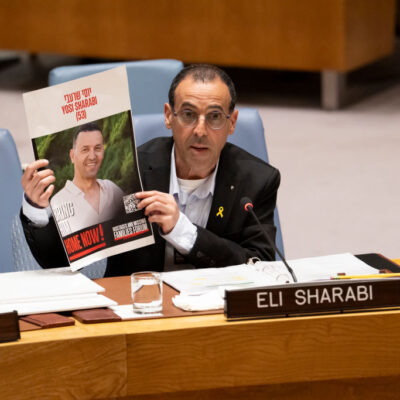MAKE THE DESERT BLOOM
JFNA commits $12.5 million to fund helping farmers replace equipment destroyed, stolen in Oct. 7 attacks
Volcani International Partnerships's ReGrow initiative is meant to supplement the government compensation for the farmers whose vehicles, tools and infrastructure were damaged or looted

Alexi J. Rosenfeld/Getty Images
Citrus fruits fall on the ground in Kibbutz Nir Yitzhak as residents refrain from returning to the Gaza border community on March 21, 2024.
The Jewish Federations of North America committed $12.5 million toward a new initiative to help Israeli farmers from Gaza border towns whose equipment was destroyed or stolen in the Oct. 7 terror attacks purchase replacements ahead of the spring planting season, the organization said.
“It’s a lot of money, but this one was easy,” Rebecca Caspi, the head of JFNA’s Israel office, told eJewishPhilanthropy. “We see this as so morally right and important and significant.”
To JFNA, supporting Israeli farmers in the Western Negev represents concrete support for the “Zionist dream” of “making the desert bloom,” Caspi said, referring to David Ben-Gurion’s vision for the Negev.
“Our goal is to help the people of Israel and the country recover and grow stronger following these horrific events,” she said.
In addition to the large-scale slaughter of civilians and attacks on military positions, Hamas terrorists deliberately targeted farming equipment and infrastructure in their rampage through southern Israel, one of the primary areas of agricultural production in the country. Cars and farming vehicles were also stolen from the area and driven into Gaza.
“Hamas came to destroy our identity, our community and our agriculture. Our victory is to go back to our fields and make them green again,” Moran Freibach, head of agriculture and security for Kibbutz Nahal Oz, said in a statement.
Caspi said that learning about the targeted “assault on agriculture” was “a very emotional process of understanding the depths of evil” of the Oct. 7 attacks.
While farmers are eligible for compensation through the Property Tax division of the Finance Ministry (known in Israel as Mas Rechush), this generally does not cover the full cost of replacing the damaged or stolen equipment. This is because the compensation covers the estimated value of used equipment, but there is not a large used market in Israel, meaning farmers have to buy new equipment, which is significantly more expensive, Caspi said.
In order to help these farmers — and the Israeli agricultural industry more broadly — Mishkey Hanegev, a consortium representing the farmers from the region, and Volcani International Partnerships, which is affiliated with the agricultural research Volcani Institute, launched the fund ReGrow. Through it, farmers and farming communities can receive grants — not loans — to cover the costs of purchasing new equipment and installing new infrastructure.
Volcani International Partnerships reached out to JFNA to see if the organization would be willing to support the initiative.
JFNA has committed to providing half of the $25 million funding for this initial stage of ReGrow’s efforts, with the rest coming from the Israeli Finance Ministry. Volcani’s executive director, Danielle Abraham, told eJP that the organization is looking to secure another $25 million in funding for “other huge emergency needs.”
Caspi said that while JFNA is prepared to provide the $12.5 million, it has also “issued an invitation to federations, donors and other foundations to join us in this effort.” If other donations come through, JFNA would “make room for them” and scale back its funding for the project, redirecting that money to other projects, she said.
Caspi explained that with the spring planting season approaching, and the need for new equipment growing, “there was a ticking clock,” so JFNA committed to the $12.5 million while searching for additional partners.
Abraham said that this funding from JFNA would go toward “putting some of the foundations down” for the recovery process and that her organization would then look for additional sources of funding to address farmers’ other “emergency needs.”
She said the organization will next look to “respond to the labor crisis [in the agricultural sector], not with volunteers but with strategic technological solutions that are already on the market.”
In a statement, Abraham said that the involvement of JFNA also “sends the most moving message to all our farmers, that they are not alone.”
Earlier this month, Jeff Schoenfeld, the co-chair of JFNA’s Israel Emergency Fund, told the Jewish Telegraphic Agency that JFNA was stepping in with funding for the initiative as the Israeli government had said it wouldn’t.
“The last chapter has not been written. There still are ongoing conversations with the government about covering some of the costs, but, initially, JFNA has stepped up to say this is so vital for the economic recovery of the south, that we’re going to make this happen,” he said.
Abraham said the allocation committee was still developing the selection protocol for the grants process but that it would likely align with the requirements of the Finance Ministry — farmers in the Western Negev whose property was damaged in the Oct. 7 attacks.
“The goal is to make it as smooth and with as little bureaucracy as possible,” she said.

 Add EJP on Google
Add EJP on Google















